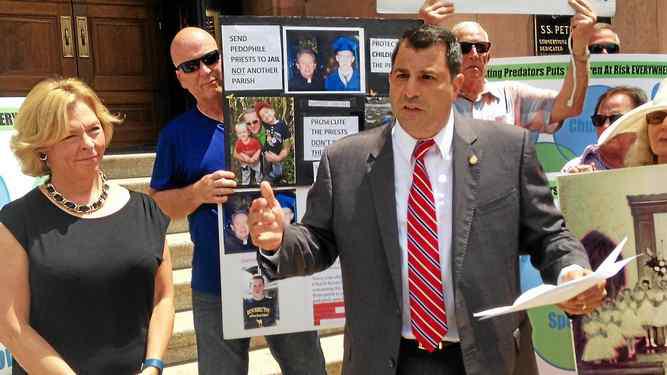|
Editorial: A ‘retro’ look at the battle of House Bill 1947
Daily Times
Retro or not retro. No, we’re not talking about the latest fashion craze.
We’re talking about serious legislation that would change the way Pennsylvania deals with child sexual abuse.
Last spring the Pennsylvania House voted overwhelmingly 180-15 in favor of House Bill 1947. The measure would eliminate the statute of limitations for child sexual abuse cases, and also extend the window of opportunity for victims to file civil actions against their abusers.
Under current Pennsylvania law, victims have 12 years after they turn 18 to file a lawsuit against their abuser. In other words, to age 30. House Bill 1947 would extend that window another 32 years, to age 50. But a controversial amendment to the legislation offered by Rep. Mark Rozzi, D-Berks County, would make that provision retroactive, meaning victims from as far back as the 1970s could still get their day in court today.
The retroactive language was bitterly opposed by the insurance industry, the National Catholic Conference and the Archdiocese of Philadelphia. Archbishop Charles J. Chaput sent a letter that was read in every parish in the archdiocese slamming the measure as no less than an attack on the church, warning of dire consequences if it became law, and urging parishioners to contact their state senators to oppose it when it came up in that chamber. They made the argument that the law unfairly targets private institutions – in other words the Catholic Church – as opposed to public organizations. Chaput warned of possible church closures, layoffs and cuts in social services should the measure become law.
Several state representatives, including at least two here in Delaware County, say they took heat from the church for their support and votes in favor of House Bill 1947. State Rep. Nick Miccarelli, R-162, of Ridley Park, actually had his name casually dropped in his parish bulletin as a friendly reminder to parishioners that he had supported the measure. Rep. Jamie Santora, R-163, of Upper Darby, complained that the church’s tactics came dangerously close to “electioneering.”
The church’s full-court press worked. The measure passed in the Senate – but only after the retroactive language was stripped from the bill.
The statute of limitations for criminal charges would be waived, and victims would have more time to sue, but only in cases going forward from the time the measure becomes law, if it ever does.
Now the Senate version is back in the House, and the question is whether or not the retroactive language will be put back into the measure for a vote by the House.
Rozzi, himself a victim of abuse at the hands of his parish priest decades ago, held a press conference several weeks ago previewing the fall session of the Legislature and vowed to put his amendment back in the bill, and block any attempt to strip it out again.
Last week House Republican leaders said the plan was to put the retroactive provision back in the bill and let the House vote on it.
But there are a couple of things complicating the issue.
One is the fact that every member of the House is running for re-election in November. It’s not hard to imagine the kind of pressure that could be heaped on these public servants by those opposed to the retroactive language in the bill.
The Republican leadership that controls the House could offer some cover for its rank and file by not allowing the measure to come to a vote.
Then there is the matter of the whole thing bogging down in the Senate again, as it did earlier this summer after passing the House.
Part of the debate no doubt would center on the same issue it focused on then, that being whether or not the retroactive language in the bill would pass constitutional muster.
At hearing held by the Senate Judiciary Committee, then-Solicitor General Bruce Castor, at the time the No. 2 man in the attorney general’s office, testified he believed the retroactive language was plainly unconstitutional. It was not a unanimous opinion. Others disagreed, and still others believe the Legislature should have approved the measure and then let the courts determine whether it’s constitutional.
Adding to the murkiness, new Attorney General Bruce Beemer, who replaced the convicted Kathleen Kane, said recently he did not think the retroactive language violated a person’s constitutional rights.
Rozzi hailed Beemer’s comments, saying, “It’s a great day for victims knowing we have an attorney general who is not afraid to stand up and do what is right and fight for the victims of this commonwealth.”
But including the retroactive language in the bill could lead to defeat in the Senate, or simply bog down the process. If it is once again passed by the House, despite the vocal opposition, it could simply stall in the Senate. If it’s not voted on by the end of the session in December, it would have to be reintroduced again next year, basically putting the push for reform back to zero.
That would sacrifice the clear gains in the bill backed by both the House and Senate. That is making the changes in the statute of limitations as well as the window to file civil suits in future cases.
That’s where the measure stands now.
The ball is in Rep. Rozzi’s court.
Retroactive or not retroactive? We’re about to find out.
|
.
Any original material on these pages is copyright © BishopAccountability.org 2004. Reproduce freely with attribution.
